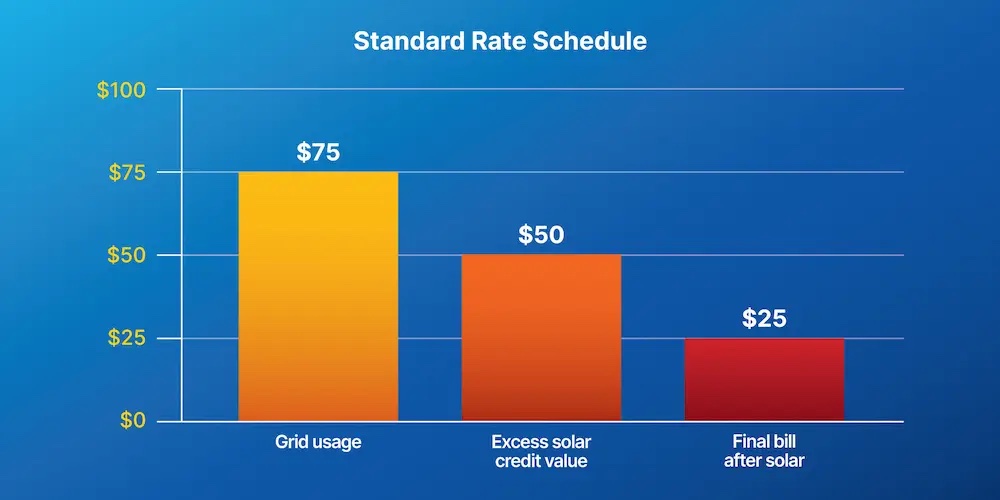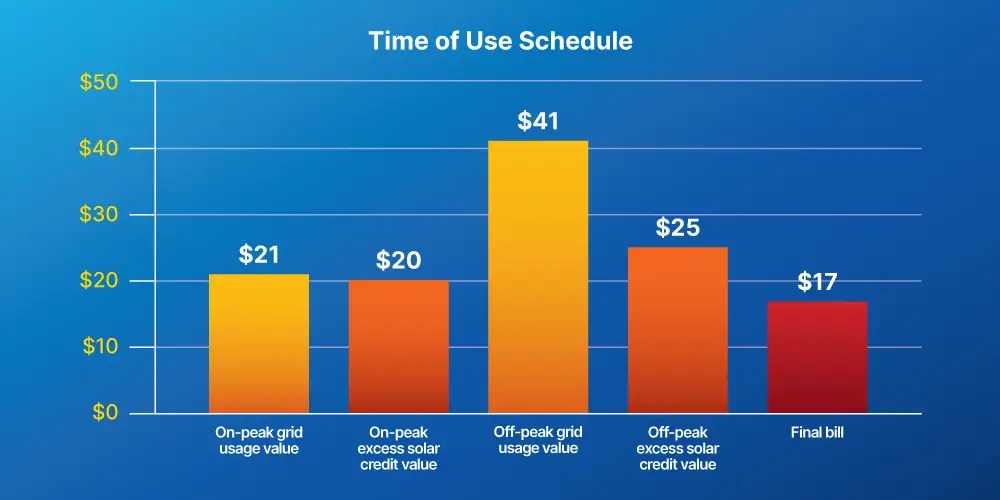Updated 11 months ago
Going solar in North Carolina: net metering, incentives, and battery storage
Written by
Catherine Lane

Find out what solar panels cost in your area
Let’s face it - it’s no fun paying electricity bills, especially when they keep getting more expensive every year. It probably seems like there’s nothing you can do about it, but that’s not the case!
You don’t have to remain beholden to Duke Energy or Dominion. North Carolina homeowners can take their energy into their own hands by installing solar panels. Aside from generating clean electricity, solar panels can save thousands of dollars every year on utility bills thanks to something called net metering.
But, figuring out how to go solar can be a bit intimidating. That’s why we’ve broken down what you need to know about installing rooftop solar in the Tar Heel State from how net metering works to how much you can save.
North Carolina net metering at a glance:
-
North Carolina requires the state’s investor-owned utilities, Duke Energy Progress, Duke Energy Carolinas, and Dominion, to offer their solar customers full retail net metering.
-
To save the most with solar panels, homeowners should opt to use their utility’s standard rate schedule, as net metering with Time of Use rates doesn’t save as much money.
-
Solar panels can eliminate your entire electricity bill, aside from certain mandatory charges, potentially saving net metering customers over a thousand dollars per year.
-
You would need to spend about $13,000 on a solar installation, after the 30% federal tax credit, to cover the average $150 electricity bill in North Carolina.
-
Going solar in North Carolina is a worthwhile investment thanks to net metering.
The components of the FranklinWH Power System
Net metering is a way for utilities to bill customers who generate their own electricity from a renewable energy source, most commonly home solar panels. This is the main way that solar panels can save you money on your electricity bills.
Here’s how it works: solar panels produce energy to power your home when the sun is shining. Sometimes, the panels produce more electricity than your home needs, so the excess energy is sent to the grid. With net metering, your utility company credits you for this excess energy at the full retail rate of electricity. The solar bill credits can roll over from month to month but expire completely on May 31 each year.
Duke Energy Progress, Duke Energy Carolinas, and Dominion Energy are all required by North Carolina law to provide some form of solar buyback program to customers. All three utilities follow the same basic billing rules, which vary depending on the rate schedule you use.
Standard rate schedule

The excess solar energy your panels generate offsets the cost of the energy you send to the grid.
If you’re served under a standard residential rate schedule, the energy your solar panels generate will first be used by your home. Any excess electricity will be sent to the grid and spin your electric meter backward, which lowers your electric meter read for the month and reduces your bill.
Your final electricity bill will be calculated by subtracting how much excess energy your solar panels sent to the grid over the month from how much electricity you used from the grid. If you send more solar energy than your home uses, the credits will be carried over to next month's energy bill and reduce your future energy usage.
For example, if your solar panels sent 50 kilowatt-hours (kWh) of excess electricity to the grid in one month, and your home only used 40 kWh from the grid, your energy charges for the month would be $0. Plus, you would have 10 kWh credits leftover that will reduce next month's bill.
But what if you use more energy from the grid than your panels produce? Well, let’s say your solar panels sent 50 kWh to the grid, and your home used 70 kWh, you would only be billed for 20 kWh.

Extra solar energy sent to the grid during on-peak hours covers the cost of energy taken from the grid during on-peak hours, while off-peak excess generation only offsets off-peak usage.
If you’re a Time of Use customer, net metering works a little differently. Just like with the standard rate, your home will first use the solar energy generated, and any excess will be sent to the grid.
If the extra solar energy is generated during off-peak hours, those credits can only be used to offset future off-peak consumption from the grid. If the excess solar is generated during on-peak hours, the credits will first be used to offset future on-peak usage, and any on-peak credits left over can then be used to cover any remaining off-peak usage.
Exactly how this will all work depends on what the utility defines on-peak and off-peak hours to be. But, in general, you can expect to save less money with solar panels when you use Time of Use rates than if you use a standard rate plan.
Net metering won’t be around forever. Duke Energy has filed a proposal with the North Carolina Utility Commission to change its net metering policy for solar systems installed after 2022. The changes would include requiring Time of Use rates for solar customers and requiring existing solar owners to pay additional fees starting in 2027 if they want to keep their current net metering rates. The proposal has yet to be approved by regulators, but it’s a good idea to go solar sooner rather than later to maximize the benefits of net metering.
Can solar panels eliminate your entire electricity bill in North Carolina?
Even if you install solar panels, you will still get a bill from your utility company every month. The solar power that panels produce can only be used to offset energy charges on your electricity bill. This means you still have to pay a minimum bill that consists of things like customer charges, basic facilities charges, and demand charges, if applicable.
However, solar will still reduce your electricity bill substantially and can get rid of all of your energy charges. So, if your utility bill was $150, and $14 of it consists of a basic facilities charge, that leaves you with $136 of energy charges that can be completely eliminated by solar. Sure, you would have to pay a total of $168 in facility charges over the year, but solar would be saving you over $1,600.
The actual savings you get from solar will vary depending on several factors, like how many solar panels you install, how much energy you use, and what rate plan you’re on.
Will installing a solar battery save you more money on your electric bill?
If you use Duke Energy or Dominion’s standard rates, a battery won’t save you any additional money. Installing a battery can save you a little bit more money on your electricity bill if you use Time of Use rates, however, the increase in savings won’t recoup the cost of installing the battery.
Most home energy storage installations cost somewhere between $10,000 and $20,000 on top of what you’re already paying for solar. This means battery installations don’t make a whole lot of sense from a financial perspective for most North Carolinians.
But, there are other benefits to installing solar batteries that could make the high price tag worth it for you, like having access to backup energy in case of a power outage and decreasing dependence on the utility.
Does North Carolina offer solar incentives?
North Carolina doesn’t have any state-issued solar incentives. However, most homeowners can take advantage of the federal solar tax credit when they install solar panels. The tax credit is equal to 30% of the total cost to install solar panels on your roof. The average solar installation in North Carolina costs about $18,600, which would earn a tax credit of just about $5,580.
Both Duke Energy Progress and Duke Energy Carolinas offer a rebate for customers who go solar. The incentive is worth $0.40 per watt of solar installed, up to $4,000, for residential customers. The average solar panel system in North Carolina would earn just about $2,800 through Duke Energy’s program. Unfortunately, the program’s last application window will be January 11, 2023 to January 18, 2023. After that, the rebate will expire completely.
Is it worth it to go solar in North Carolina?
It is absolutely worth it to go solar right now in North Carolina! The state’s largest utilities offer full retail net metering which leads to huge energy bill savings, and the 30% clean energy tax credit helps substantially reduce the cost of installing solar panels. Most solar panels installed in North Carolina end up paying for themselves in as little as 10 years! That means you can get 15 years of free, clean electricity.
But, it won’t stay that way forever. As we mentioned earlier, solar net metering as we know it won’t be around forever, in fact, Duke Energy is seeking to end it in 2023! That’s what makes now the best time to go solar in North Carolina. Don’t wait - or you could be tied down to your utility paying expensive energy bills for years to come.
Catherine has been researching and reporting on the solar industry for five years and is the Written Content Manager at SolarReviews. She leads a dynamic team in producing informative and engaging content on residential solar to help homeowners make informed decisions about investing in solar panels. Catherine’s expertise has garnered attention from leading industry publications, with her work being featured in Solar Today Magazine and Solar ...
Learn more about Catherine Lane